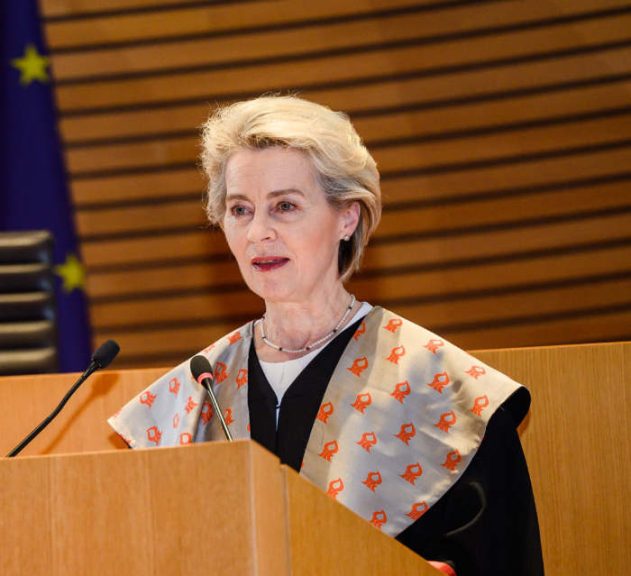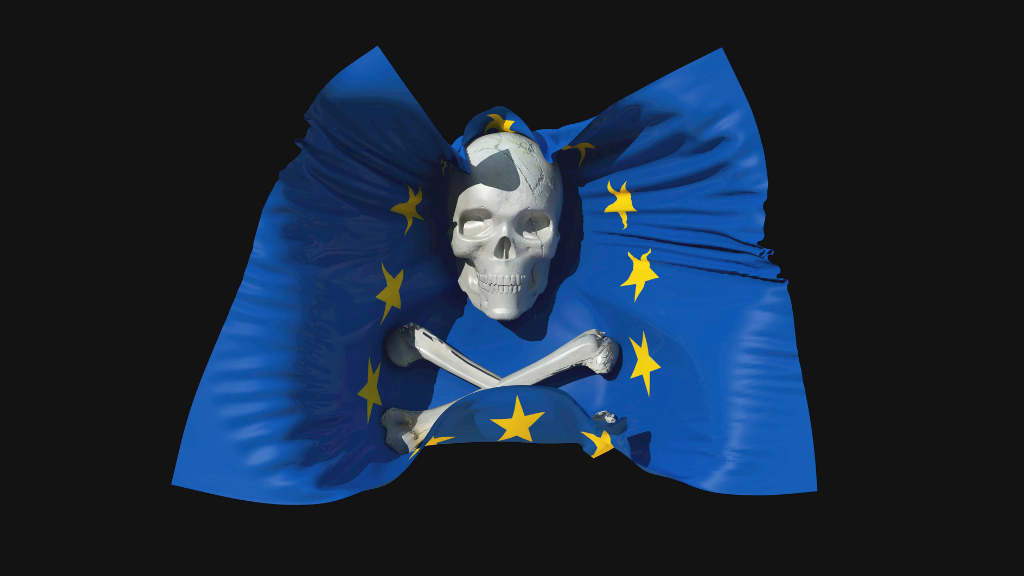The concept of evil and the ability for it to permeate into entire societies is not new, with perhaps the most recent example being Nazi Germany, where the German people themselves both voted the Nazi party into power and then seemingly looked the other way as atrocities were committed. The concept of evil as a ‘soft’ power rather than hard, obvious cases of rape and murder is even more insidious than the latter – evil happens because societies let it happen, even if their members do not individually commit crimes.
But is Europe following the same path? While pro-Europeans would pass such a question off as ‘propaganda’, doing so also invites the same criticism: ignoring a creeping wave of indifference of an attitude rather less than benign.
The Orthodox Church Example

We can start, for example, with the Russian Orthodox Church, an institution that has been in existence since the year 988. It began during the era of the ‘Christianisation of Rus’, interestingly, in Kiev. The centre of the church was moved to Moscow in the early 14th century, where it has remained ever since. The Russian Orthodox Church – one of numerous Eastern Orthodox Churches, yet significantly the largest, with an estimated 120 million followers.
Most major religions link together the clergy and government, with the church being a pillar of the state. King Charles III, for example, is the Head of the Church of England. In Russia though, the most senior figure of the Orthodox Church is not Vladimir Putin; it is Patriarch Kirill.
However, schisms have begun to appear. Ukraine (whose current leader is Jewish) banned both the Russian Orthodox Church and the Ukrainian Orthodox Church in 2024 in order to “protect the constitutional order of Ukraine”. About 80% of the Ukrainian population are Orthodox Christians. There have been protests and the unedifying sight of elderly Ukrainian parishioners being manhandled out of Orthodox churches, of the clergy being assaulted, and churches either closed, their valuables stolen, and even re-purposed as refuse dumps. The Ukrainian population is being forced to choose between supporting President Zelensky or God as their saviour and their ultimate authority.
Ukrainian Orthodox priests reluctant to break away from the church have seen churches and homes searched, with many detained for questioning by the SBU (Ukraine’s Police), accused of support for anti-fascist forces purely because they are Orthodox Christians. This situation continues, while the ban has drawn concern from the United Nations, Pope Francis, and the World Council of Churches, with organizations like Human Rights Watch stating such behaviour violates freedom of religion.
While Ukraine thus far is the only European country to have enacted a complete ban, others appear to be following in these footsteps.
The Latvian government legally separated the Latvian Orthodox Church from the Russian Orthodox Church in 2022, with the Latvian Parliament passing the appropriate law. The Estonian Orthodox Church was separated from the Russian Orthodox Church by Estonian law in 2024 due to concerns about its “ties to Moscow and potential use as a tool of Russian influence”.
Lithuania has also established an ‘independent Orthodox Church’, passed sanctions against the Russian Patriarch Kirill, and has asked for its numerous Russian Orthodox Churches (including a major European nunnery) to close.
All three of the Baltic Churches are now effectively under state control, with the president of each country needing to be notified, by law, to approve the appointment of the head of the church, metropolitans, archbishops, and bishops. This means the head of these churches is now a politician as opposed to a religious figure.
These crackdowns have uncomfortable historical echoes, as the mass arrest and killing of Orthodox clergy, who were seen at the time as potential Russian agents, was one of the first acts of the Austro-Hungarian Empire at the outbreak of World War One. What started as minor-level religious harassment ended up with a war where 20 million people died. Evil?
The Rise Of The Atheist Church

When politicians, rather than religious leaders, become heads of a church or representatives of a faith, matters can very rapidly degenerate into chaos, killings and war. Whether this is because religious belief and compassion are replaced with a lack of spirituality and indifference is a theological matter; however, the differences are stark. While the initial act that spurred the situation in Gaza was horrific, the resulting offensive has been even more so – an escalation of evil created by an act of evil. The Israeli Prime Minister, Benjamin Netanyahu, has both instigated and legally authorised what is now being recognised as a genocide against not the perpetrators of the original crime – but an entire people – the Palestinians.
A total of 1,139 people were killed in Israel during the October 7 attacks, and about 200 were taken captive. In response, Israel’s war on Gaza has killed at least 64,656 people and wounded 163,503 since October 2023. An enforced blockade means that infants are now starving to death. This is not the old biblical vengeance of ‘an eye for an eye’. It is the mass murder of civilians.
However, with the rise of the Atheist Church in Europe, politicians, rather than religious leaders, have been able to control this narrative and have prolonged the situation, resulting in even more deaths. Public protests against the situation have resulted in arrest and detention, while a rallying call has been proclaimed that anyone that is against the Gaza operations is themselves antisemitic. Legitimate concern is now labelled racist. Is this evil?
The Head of the EU Commission, Ursula von der Leyen, donned a Jewish scarf and made a religious proclamation in March this year, stating that “Europe holds the values of the Talmud” – a reference to the central creed of Rabbinic Judaism. Yet Europe is not Jewish; it is fundamentally Christian. Problematic too are the religious references in Europe’s political discourse by someone not qualified nor ordained to do so. It is a rise of an Atheist Church manifesting itself as a spiritual authority.
In doing so, Von der Leyen gave explicit support for Netanyahu’s actions, also bringing into place an “EU Strategy on Combating Antisemitism and Fostering Jewish Life” that covers a code of conduct as to how EU citizens should act towards Jewish society. Instead, this has been used to suppress dissent over Gaza. European citizens have been jailed for protesting while criticism about it is labelled ‘a hate crime’. Is the use of religious texts by politicians to promote political agendas and fund conflicts, and then to stifle subsequent protests, evil?
Media

There is no doubt that in today’s world, governments and politicians have abandoned any efforts to seek truth and now wish to impose their own narratives. Governments direct their respective mainstream media on what to print and how to say it: the era of impartiality is over. The impact of this is threefold. Firstly, it projects a national opinion based upon specific political aims instead of truth and reality; secondly, it denigrates any alternative viewpoints as propaganda; and third, caught in the middle, any remaining readers become confused as to what is real and what is not. This can be seen quite clearly in today’s narratives.
There have been two recent examples in just the past week. Firstly, the EU Commissioner, Ursula von der Leyen, was part of a story that stated her aircraft had been targeted by Russian GPS jamming equipment, and this had caused a 90-minute delay, endangering her flight. However, subsequent flight data released by Flightracker revealed this story to be untrue.
Secondly, the amount of information and disinformation concerning the recent findings of Russian drones in Poland has resulted in a huge variety of stories. Some reports say there were three drones; others state 19. Some suggest they hit an apartment block; others that they landed in fields. Some say they were flown from Russia, others from Belarus, or even Ukraine. The point here is that the story, whichever one is real, has resulted in some EU politicians describing it as an ‘act of war’ by Russia upon Poland and that NATO should attack Russia in response. Is that reasonable? Or is it the use of differing stories to create confusion and escalate an already tense situation. If that premise is correct, yet the story is false, is that not a form of evil?
It is precisely because these kinds of stories are being repositioned by various segments of the mainstream media that the best, most responsible commentary and coverage are now found not in specific national media but by online bloggers or commentators operating without government assistance yet with a large amount of common sense. Remarkably, amongst all the noise, they can still be found on channels such as X, Instagram and so on. What isn’t recognised is that the old media methodology is evolving – big names such as the Financial Times, Die Welt and the New York Times, amongst others, are not significant enough to control the entire narrative. Curiously, the more their viewing numbers drop, the more sensationalist their ‘news’ coverage becomes. Reader volumes equate directly to income, and if someone dies – or a war breaks out as a result, well, that can be put down to ‘news’. Is that evil?
Social Attitudes

When questions arise that pose ethical, moral, historic, legal and expression of freedom issues – and especially if they have anything to do with Russia – the posting of such material always finds online responses. We recently ran on X what was originally a Latvian State broadcaster story about a Latvian man who had pinned an archaic Peter the Great-era flag onto the outer wall of his house in a small Latvian town and had gotten into trouble.
It was a minor incident and a small story; however, it did reveal perceptions about Latvian history, its attitude towards its own past, as well as the fundamental right of ‘Freedom of Expression’ – which is enshrined in the Latvian constitution. That is now rubbing up against recent laws regarding ‘hate symbols’. From that perspective, it’s an interesting debate and should be of interest to Latvians, as it concerns their, not Russia’s, freedoms. The result? No intellectual debate whatsoever, but a whole screenload thread full of poo and vomit emoji symbols, racism, and intense vulgarity. One person even posted an image of a Nazi swastika flag on X, stated it was part of Russian history, and argued that it was therefore permissible to be displayed.
When discussing valid points about freedom of expression and civil liberties, are such crude, ill-thought responses in danger of becoming evil?
Of course, much of the same can be seen throughout European newspapers and online media. The entire European continent is full of hate speech provided by anonymous trolls. Is this evil? Because if it is – and becomes endemic, such as the banning of churches and the suppression of truth over propaganda, then Europe is on a path to war, one of the great evils. Whether that evolves into a ground and air war with Russia, the development of another European war as people take sides, or even a Third World War, there are progressive elements of a developing evil here.
If not dealt with, then the evil that currently exists will slowly continue to feed on the existing unrest and will eventually reach its maximum potential. A more humanitarian class of European politicians is desperately needed in place, within the EU, to reverse this slow, yet progressive trend.
Is Europe becoming evil? It’s a scenario that Europeans need to face up to. There is precedent, twice before: World War One and World War Two. As Einstein said, “There will not be a World War Four.”
Further Reading
Are Russians Becoming More Eurasian Than European? The Societal Implications

 Русский
Русский













